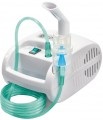Medicine container
The nebuliser's built-in medicine reservoir volume is a crucial consideration. It's important to align this parameter with medical guidelines for the prescribed treatment. A too-small capacity may require frequent refilling, disrupting the treatment process.
Also, knowing the volume of the reservoir and the nebulization rate (see below), it is possible to estimate the operating time of the nebuliser on a single refill.
Compressor power
The power consumed by the compressor of the nebuliser during operation; in this case, it means not only the corresponding element of compressor models (see "Type"), but also the nebulizer in ultrasonic devices.
The performance and power consumption of the nebuliser depend on this parameter. The more powerful the compressor, the higher the possible air flow rate and, accordingly, nebulization. At the same time, powerful devices consume more power (which is especially important when powered offline, see below) and can generate quite a lot of noise.
Max air flow
The maximum air output of a compressor nebuliser during operation is a key factor to consider. It's important to note that actual performance during normal operation is often lower. Different applications have recommended air flow intensities, and knowing this parameter helps assess how well the inhaler aligns with specific recommendations.
Nebulization rate
The nebuliser's nebulization capacity per minute.
The ideal nebulization rate can differ based on factors such as the patient's health condition, the type of disease, and the composition of the inhaled medication, as outlined in medical guidelines. This rate is crucial in assessing the inhaler's effectiveness for specific situations and also influences how long the device operates on a single medication refill.
Some models have a nebulization speed control — in such cases, the maximum value is usually indicated in the characteristics.
Particle size
The aerosol generated by a nebuliser contains droplets of varying sizes. Smaller droplets have an easier time reaching the narrow passages of the bronchi, delivering the medicinal substance deeper into the respiratory system. For optimal therapeutic effects, it is recommended that droplet sizes do not surpass 5 microns. It's worth noting that during the atomization process, particles may vary in size, and their values are often expressed as a range.
Medium particle size (MMAD)
Since not all particles have the same size, this paragraph indicates exactly the average, most common particle size when splitting in this inhaler. Accordingly, lower values allow easier and deeper penetration into the bronchi.
Particle size changing
Possibility
to change the size of the particles created during the nebulization of the medicinal product. See above for size value. Here we note that high penetrating power is not always required: for some diseases (for example, inflammation in the larynx or trachea), it is not necessary to deliver the medicine deep into the bronchi. Accordingly, by changing the particle size, it is possible to control the delivery distance.
Nozzles
Types of nozzles included in the delivery of the nebuliser.
—
The mask for adult. A mask is a dual-purpose nozzle covering both the mouth and nose, typically secured with a strap. It ensures effective drug inhalation, accommodating variations in breathing patterns. Masks are versatile, suitable for use during sleep or unconsciousness. However, their larger size may hinder portability when carrying them with a nebuliser (refer to "Purpose"). Despite their convenience, specialized devices offer higher aerosol concentration. This type of mask is tailored for the average adult.
—
Children's mask. Reduced version of the mask, designed for children. The design may provide additional decorative elements (see "Appearance for children"), and in terms of functionality and main features, such masks do not differ from the adults described above.
—
Nozzle for nose. A drug delivery nozzle for the nose typically features a distinctive "fork" shape with two separate protrusions inserted into the nostrils. These protrusions may gently compress the nasal septum, ensuring comfortable usage. These devices are particularly effective for treating conditions focused on the nasal cavity, such as rhinitis, as they provide a higher medicine concentration compared to masks. Additionally, nasal nozzles are more compact for easy storage.
— Nozzle for mouth.
...An inhalation nozzle designed for drug administration through the mouth is a specialized device that offers a higher concentration of the active substance compared to a mask. This is particularly beneficial for intensive treatment of the oral cavity or larynx. Despite their small size, these nozzles are well-suited for use with pocket nebulisers. However, a drawback is the requirement for conscious patient participation, as they need to securely hold the tube with their lips and inhale through the mouth. While not as convenient as a mask, it somewhat restricts the application scope.
